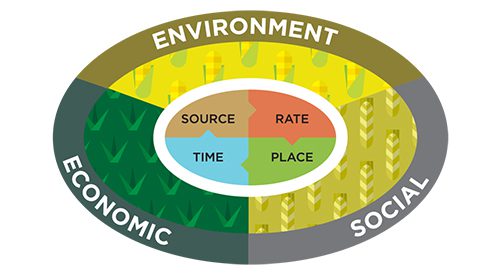12 Environmental and Health Benefits of Nutrient Stewardship
As the UN Environment Assembly met this week under the theme of “Strengthening Actions for Nature to Achieve the Sustainable Development Goals,” IFA has been sharing knowledge about how mineral fertilizers can help transform food systems in IFA for Nature week. Here’s a look at some of the numerous environmental and health benefits fertilizers provide:

1. Limiting deforestation and biodiversity loss
By increasing productivity on existing farmland, fertilizers reduce deforestation and biodiversity loss by minimizing land use changes. Increased yields from fertilizers helped preserve 1 billion hectares of land between 1961-2005.

2. Preventing and reversing soil degradation and desertification
Fertilizers help prevent and restore land degradation and desertification because they replenish soil nutrient pools. Globally, 3.2 billion people are affected by land degradation while 24 billion tonnes of fertile soil are lost every year.

3. Growing food with less water and in arid conditions
Food can be efficiently grown with less water and in arid conditions by using fertigation: combining drip irrigation with soluble fertilizers. Fertigation can produce up to 90% water and nutrient use efficiency.

4. Increasing carbon capture in soils
Carbon sequestration (trapping and storing CO2) on farmland can be increased by using fertilizers to grow more plant matter. With better management, including nutrients, agricultural soil could store up to an extra 1.85 billion tonnes of carbon each year, equivalent to 7 billion tonnes of CO2.

5. Reducing nutrient losses to the environment
Nutrient Stewardship Initiatives based on the 4Rs (using the right nutrient source, at the right rate, at the right time and in the right place) optimize crops’ nutrient uptake and reduce losses to the environment. Thanks to Fertilizer Best Management Practices, nutrient runoff to the Great Barrier Reef in Australia diminished by 18% per year between 2009 and 2015.

6. Feeding the growing global population
Fertilizers help feed the world. The essential plant nutrients provided by mineral fertilizers are estimated to be responsible for producing 50% of the food that farmers grow today. With an expected 50-100% increase in food demand by 2050, fertilizers will be vital for ensuring food security.

7. Improving crop health and resilience
Scientists have predicted that extreme weather will increase at least threefold in many areas, which could jeopardize plant yields. By improving their health and resilience, fertilizers can help plants adapt to a variety of extreme weather conditions, from flooding to drought.

8. Boosting farmers’ yields and incomes
For every 1 kg of nutrient applied, farmers obtain 5-30 kg of additional product which can double or triple farm productivity within a single cropping season. Some 500 million smallholder farms manage an average of 70 to 80% of all agricultural land. By improving crop yields, fertilizers enhance rural living standards and drive sustainable rural economic development.

9. Providing essential nutrients
In addition to making a key contribution to our supply of calories, fertilizers also help provide all the essential nutrients that the human body requires. As plants are the primary source of nutrients for humans and animals, there is a direct and indirect link between fertilizer application to plants and human and animal nutrition.

10. Fighting micronutrient malnutrition
More than 2 billion people suffer from micronutrient malnutrition referred to as “hidden hunger”. A total of 50% of world cereal soils are deficient in zinc, 30% of soils globally are deficient in iron and most of the world’s soil is iodine deficient. Fertilizers can help minimize deficiencies by enriching (biofortifying) soils and staple food crops with micronutrients such as zinc, iron, selenium and iodine.

11. Increasing plants’ disease and pest resistance
Scientific research has shown that healthy plants are better able to fend off pathogens: the occurrence of pests and diseases is higher when the plant is stressed and malnourished. Well adapted fertilization contributes to plants’ vigor and their ability to fight diseases, ensuring more and higher quality crops can be grown.

12. Extending the lifecycle of food
Fertilizers can extend the lifecycle of food by improving the post-harvest integrity of crops and thus increasing food security. Calcium and boron-containing fertilizers, for example, help strengthen plant cells, making crops more resilient and potentially longer lasting.
Find out more about IFA For Nature Week on our LinkedIn page, here.

